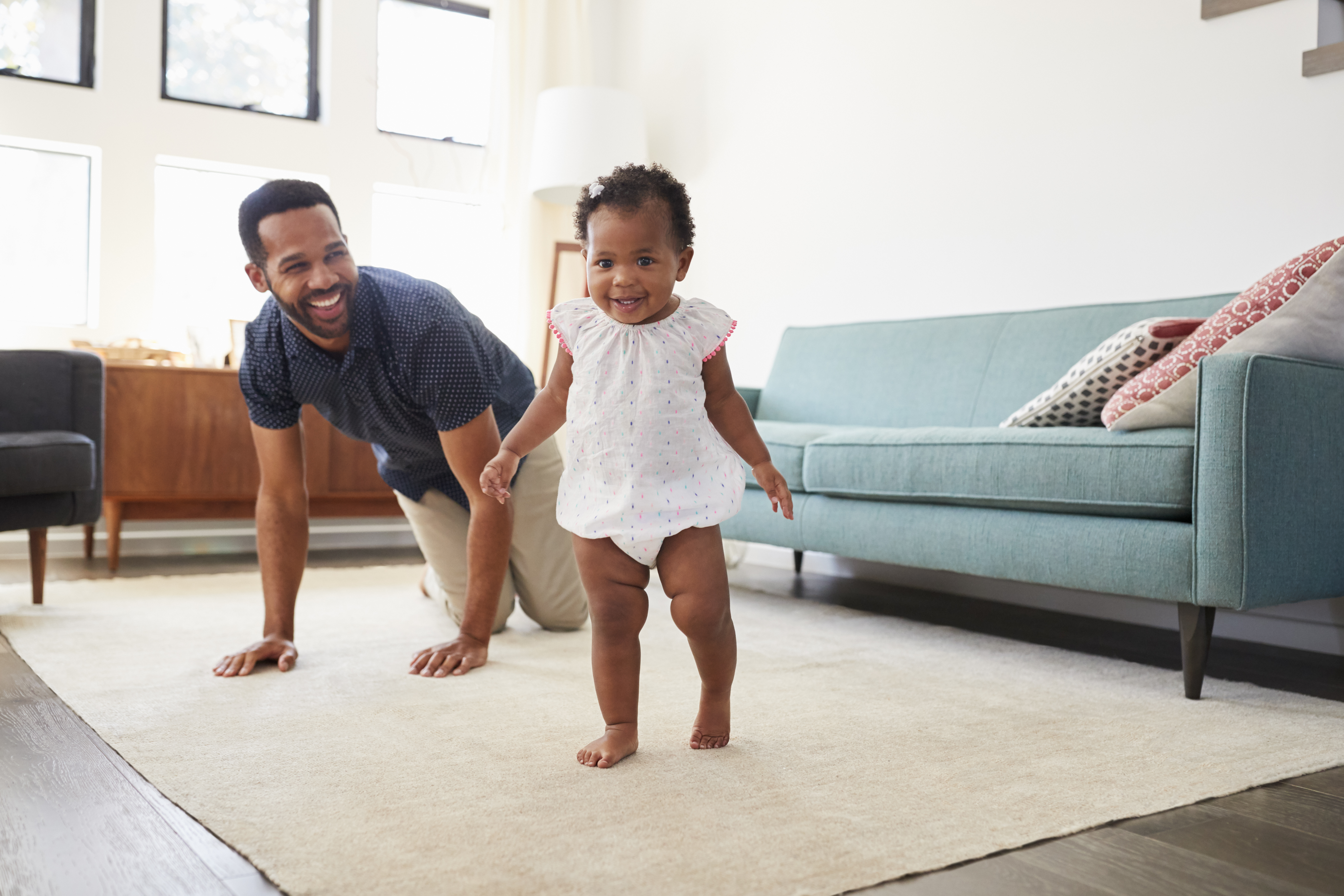Parent Guide: Motor Milestones
As a parent of an infant or toddler, you may find it difficult to know whether to be concerned about your child’s growth and development. There are many examples of children developing at their own pace and catching up to their peers over time. When should you wait and see how your child develops? When should you speak with your child’s doctor? When should you insist on more testing or referrals?
Children should learn motor skills at certain ages. Slower motor development can happen for different reasons but might be a clue that a child needs special attention from their doctor.
You know your child better than anyone. If you have worries about your child’s development, talk with your child’s doctor. You can use this guide to help understand when to ask the doctor for more help. Any time parents are concerned about their child’s development, they should talk with their child’s doctor about their worries.
Parents should explain their concerns to the doctor and ask if screening or testing, early intervention, physical therapy, or going to a specialist is needed.
Check-in for babies who are younger than 6 months old
If your baby is less than 5 months old, it is normal for her head to lag behind when you pull baby to sitting. At 5 months and older, her head should no longer lag behind.
At 5 months old:
When you lay your baby on her back, hold onto her hands, and pull her to sitting, can she keep her head in a fairly even line with her body?
- Always
- Sometimes
- Never—her head lags behind
If you chose sometimes: Ask your baby’s doctor.
If you chose never: If your baby’s head still lags back when you pull her into a sitting position when she is 5 months or older, show your baby’s doctor and ask about an evaluation and early intervention for your baby.

Check-in for babies who are 6-12 months old
By 7 months, babies should be able to sit without help and without being propped. By 9 months, babies should be able to get into a sitting position all by themselves.
By 7 months old:
Can your baby sit by himself, with no help?
- Always
- Sometimes
- Never sits without help
If you chose sometimes: Ask your baby’s doctor.
If you chose never: If your baby can’t sit without help by 7 months, tell the doctor about your baby’s sitting and ask about an evaluation and early intervention for your baby.
By 9 months old:
Can your baby get into a sitting position all by himself?
- Always
- Sometimes
- Never gets into sitting by himself
If you chose sometimes: Ask your baby’s doctor.
If you chose never: If your baby can’t get into a sitting position by himself by 9 months, tell the doctor about your baby’s sitting and ask about an evaluation and early intervention for your baby.

Check-in for children who are 1 year old:
Most children can walk alone by the time they are 14 months old and walk well by 18 months (1-1/2 years old). If your child can walk alone, she should also be able to stand up from the floor without having to hold onto anything or pull herself up. Children should not need to push off of their knees or legs to stand up.
By 18 months:
Can your child walk alone, without help?
- Always
- Sometimes
- Never walks alone
If you chose sometimes: Ask your child’s doctor.
If you chose never: If your child does not walk well by himself when he is 18 months old, or if he gets worse at walking or stops walking, ask the doctor to watch your child try to walk. Talk to the doctor about an evaluation and early intervention for your child.
By 18 months:
Can your child stand up off of the floor without holding on to anything?
- Always
- Sometimes
- Never able to get off the floor alone
If you chose sometimes: Ask your child’s doctor.
If you chose never: If your child can’t get up off of the floor by himself when he is 18 months old, or if he starts to get worse at getting up off the floor, ask the doctor to watch him try to get off the floor. Talk to the doctor about an evaluation and early intervention for your child.

Check-in for children who are 2 years old:
Most children can run by the time they are 18 months (1-1/2 years) old and run well by age 2.
By 2 years old:
Is your child good at running?
- Yes
- Sometimes
- No, my child cannot run well
If you chose sometimes: Ask your child’s doctor.
If you chose no: If your child can’t run well when she is 2 years old, or if she gets worse at running, ask the doctor to watch her run. Talk to the doctor about an evaluation and early intervention for your child.
By 2 years old:
Does your child have a “funny” or unusual way of running?
- No
- Sometimes
- Yes
If you chose sometimes: Ask your child’s doctor.
If you chose yes: If it is hard for your child to run, or if she moves her arms and upper body a lot and has a “funny” way of running, ask your doctor to watch her run.

Check-in for children who are 3 years old:
Most children can easily walk up and down stairs, alternating feet on each step, by the time they are 3. They should not need to pull themselves upstairs using the railing, crawl up the stairs, or stop to rest.
By 3-1/2 years old:
Can your child walk up and down stairs, alternating feet on each step?
- Yes
- Sometimes
- No, my child cannot walk up and down stairs
If you chose sometimes: Ask your child’s doctor.
If you chose no: If your child can’t easily walk up and down stairs when he is 3-1/2 years old, or if he starts to get worse at climbing stairs, ask the doctor to watch him climb stairs. Talk to the doctor about an evaluation and early intervention for your child.
By 3-1/2 years old:
Does your child need to stop and rest when going up the stairs, crawl up stairs, or pull himself up using the railing?
- No
- Sometimes
- Yes, my child has these troubles with stairs
If you chose sometimes: Ask your child’s doctor.
If you chose yes: If your child can’t easily walk up and down stairs without pulling up or resting when he is 3-1/2 years old, ask the doctor to watch him climb stairs. Talk to the doctor about an evaluation and early intervention for your child.

Resources for Families
Child Motor Development
- American Academy of Pediatrics: A tool to tell when a child’s physical development may be cause for concern.
- Centers for Disease Control and Prevention’s Guide for parents of children’s milestones by age
- Centers for Disease Control and Prevention’s Guide for parents concerned about their child’s developmental progress
- Centers for Disease Control and Prevention’s Guide for parents about the Developmental Screen process (English and Spanish versions available)
- Parent-completed record of contacts and next steps in pursuing a child’s diagnosis
Early Diagnosis Makes a Difference
Genetic Testing
- If you suspect Duchenne muscular dystrophy, FREE genetic testing and genetic test interpretation is available through the Decode Duchenne program.
Information and Support Organizations
(if a neuromuscular diagnosis is suspected or confirmed)
- Cure CMD: for Congenital Muscular Dystrophies
- CureSMA: for Spinal Muscular Atrophy
- SMA Foundation: for Spinal Muscular Atrophies
- FSH Society: for Facioscapulohumeral muscular dystrophy
- Muscular Dystrophy Association: for pediatric and adult neuromuscular disorders
- Parent Project Muscular Dystrophy: for Duchenne and Becker muscular dystrophies
Early Intervention
- National Dissemination Resource Center for Children with Disabilities Early Intervention Guide
- Wrights Law Early Intervention Resources